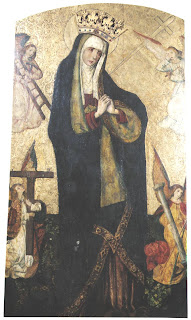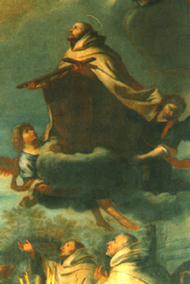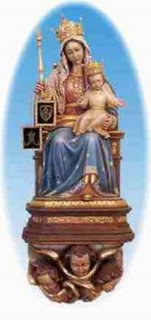 OUR LADY
OUR LADYIt is Our Lady, full of light, pure with the divine purity, who will take me by the hand to lead me into heaven - the realm of dazzling brightness.
This blog is to propagate genuine Catholic devotions in the spirit of Traditional Carmel by providing texts useful for spiritual readings and meditations. "The devil knows that he has lost the soul that perseveringly practices mental prayer" - St Teresa of Avila. "For we preach not ourselves, but Jesus Christ our Lord; and ourselves your servants through Jesus" (2Cor 4:5). Soli Deo honor et gloria. The blog is lovingly dedicated to the Infant Jesus of Prague and under His Patronage
 OUR LADY
OUR LADY
 SUFFERING
SUFFERING ON A DARK NIGHT
ON A DARK NIGHT THE CARMELITE CONTEMPLATIVE
THE CARMELITE CONTEMPLATIVE "He that is of God, heareth the words of God. Therefore you hear them not, because you are not of God" (John 8: 47).
"He that is of God, heareth the words of God. Therefore you hear them not, because you are not of God" (John 8: 47). Feast of the Annunciation of the Blessed Virgin Mary
Feast of the Annunciation of the Blessed Virgin Mary
INTROIT Judge me, O God, and distinguish my cause from the nation that is not holy: deliver me from the unjust and deceitful man, for Thou art my God and my strength. Send forth thy light and thy truth: they have conducted me, and brought me unto thy holy hill, and into thy tabernacles. (Ps. XLII. 1. 3.)
COLLECT We beseech Thee, Almighty God, graciously to look upon Thy family; that by Thy bounty it may be governed in body, and by Thy protection be guarded in mind. Through, &c.
EPISTLE (Heb. IX. 11-15.)
Brethren, Christ being come, a high-priest of the good things to come, by a greater and more perfect tabernacle, not made with hands, that is, not of this creation, neither by the blood of goats or of calves, but by his own blood, entered once into the Holies, having obtained eternal redemption. For if the blood of goats and of oxen, and the ashes of an heifer being sprinkled, sanctify such as are defiled, to the cleansing of the flesh, how much more shall the blood of Christ, who, by the Holy Ghost, offered himself without spot to God, cleanse our conscience from dead works, to serve the living God? And therefore he is the Mediator of the new testament; that by means of his death, for the redemption of those trangressions which were under the former testament; they that are called may receive the promise of eternal inheritance.
EXPLANATION St Paul here teaches, that Christ as the true high-priest of the New Testament, through His precious blood on the altar of the cross, has indeed rendered perfect satisfaction for sins, but that the sinner must also do his own part, by cooperating with Christ to make himself less unworthy of participating in His passion and merits, and to appropriate to himself its fruits. This is done when he diligently and devoutly assists at the unbloody Sacrifice of the Mass, by which the fruits of the death on the cross are attributed to us; when, according to the will of the Church, he purifies his conscience by true contrition and confession; and when he seeks by trust in Christ's merits to render some satisfaction for his sins through voluntary penance and faithful following of Christ.
ASPIRATION Grant us, O meek Jesus, Thy grace, that through perfect sorrow for our sins and the exercise of good works we may become participators in the merits of Thy bitter passion.
GOSPEL (John VIII. 46-59)
At that time, Jesus said to the multitudes of the Jews: " The Jews therefore answered, and said to him: Do not we say well, that thou art a Samaritan, and hast a devil? Jesus answered: Which of you shall convince me of sin? If I say the truth to you, why do you not believe me? He that is of God, heareth the words of God. Therefore you hear them not, because you are not of God." The Jews therefore answered, and said to Him: Do not we say well that thou art a Samaritan, and hast a devil? Jesus answered:
"I have not a devil; but I honor my Father, and you have dishonored me. But I seek not my own glory; there is one that seeketh and judgeth. Amen, amen, I say to you, if any-man keep my word, he shall not see death for ever. The Jews therefore said: Now we know that thou hast a devil. Abraham is dead, and the prophets; and thou sayest: If any man keep my word, he shall not taste death for ever. Art thou greater than our Father Abraham, who is dead? and the prophets are dead. Whom dost thou make thyself? Jesus answered: If I glorify myself, my glory is nothing. It is my Father that glorifieth me, of whom you say that he is your God. And you have not known him; but I know him. And if I shall say that I know him not, I shall be like to you, a liar. But I do know him, and do keep his word. Abraham your father rejoiced that he might see my day: he saw it, and was glad. The Jews therefore said to him: Thou art not yet fifty years old, and hast thou seen Abraham? Jesus said to them: Amen, amen, I say to you, before Abraham was made, I am. They took up stones therefore to cast at him: but Jesus hid himself, and went out of the temple.
Why did Christ ask the Jews, which of them should convince Him of sin?
To show us that he who would teach and punish others, should strive to be irreproachable himself; and to prove that He, being free from sin, was more than mere man, and therefore, the Messiah, the Son of God, as He repeatedly told the Jews, especially in this day's gospel, and substantiated by His great and numerous miracles.
Why did He say: He that is of God, heareth the words of God?
To prove that the Jews on account of their stubbornness and unbelief were not the children of God, but of the devil. "Therefore," St. Gregory says, "let every one when he hears the word of God, ask himself, of whom he is. Eternal truth demands that we be desirous of the heavenly fatherland, that we tame the desires of the flesh, be indifferent to the praises of the world, covet not our neighbor's goods, and give alms according to our means. Therefore examine yourself, and if you find in your heart this voice of God, then you will know that you are of God."
How and why did Christ defend Himself against those who slandered hate?
Only by denying with the greatest modesty the things with which they reproached Him, saying that He had not a devil, that He was not a Samaritan, because He honored His Father not in their manner, but in His own. In repelling this calumny while He left the rest unanswered, Christ removed all doubt in regard to His divine mission, thus vindicating the honor of God, and securing the salvation of man. Christ thus teaches us by His own conduct to defend ourselves only against those detractions and insults which endanger the honor of God and the salvation of man, and then to defend ourselves with all modesty; by no means however to do it, if they injure only our own good name, for we should leave the restoration of that to God, as exemplified by Christ, who knows better than we how to preserve and restore it.
How had Abraham seen Christ's day?
In spirit, that is, by divine revelation he foresaw the coming of Christ and rejoiced; also, he heard, by revelation from God, with the other just in Limbo, that Christ's coming had taken place, and derived the greatest comfort from it.
Why did Christ conceal Himself from the Jews, instead of taking vengeance?
Because the time of His death had not come; because He would show His meekness and patience and teach us that we should avoid our enemies rather than resist them or take vengeance on them; Christ wished to instruct us to avoid passionate and quarrelsome people, for it is an honor for a man, to separate from quarrels: but all fools are meddling with reproaches. (Prov. XX. 3.)
PETITION When thine enemies calumniated Thee, most meek Jesus, Thou didst answer them with tender words, and when they were about to stone Thee, Thou didst depart from them, whilst we can scarcely bear a hard word, and far from yielding to our neighbor, defend and avenge ourselves most passionately. Ah! pardon us our impatience, and grant us the grace to bear patiently the wrongs done us, and when necessary, answer with gentleness for Thy glory and the salvation of our neighbor.
Text taken from "Church's year" by Rev. Leonard Goffine, after www.truecatholic.org Read whole post...... The Roman Breviary, Second Nocturn Lessons - a Sermon by Venerable St. Bede, the Priest.
The Roman Breviary, Second Nocturn Lessons - a Sermon by Venerable St. Bede, the Priest.
 "And the soldiers platting a crown of thorns, put it upon his head" (John 19: 2).
"And the soldiers platting a crown of thorns, put it upon his head" (John 19: 2). Let us search our ways, and seek, and return to the Lord.
Let us search our ways, and seek, and return to the Lord. St Joseph Included in the Order of the Hypostatic Union
St Joseph Included in the Order of the Hypostatic Union The Introit of this day's Mass, which begins with the word Laetare, is as follows:
The Introit of this day's Mass, which begins with the word Laetare, is as follows:












V. Angelus Domini nuntiavit Mariae.
R. Et concepit de Spiritu Sancto.
Ave, Maria...
V. Ecce ancilla Domini,
R. Fiat mihi secundum verbum tuum.
Ave, Maria...
V. Et Verbum caro factum est,
R. Et habitavit in nobis.
Ave, Maria......
V. Ora pro nobis, sancta Dei Genetrix,
R. Ut digni efficiamur promissionibus Christi.
Oremus:
Gratiam tuam, quaesumus,
Domine, mentibus nostris infunde;
ut qui, Angelo nuntiante,
Christi Filii tui incarnationem cognovimus,
per passionem eius et crucem
ad resurrectionis gloriam perducamur.
Per eumdem Christum Dominum nostrum.
R. Amen.



